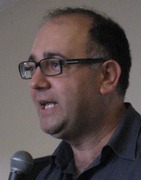Interview with Luigino Bruni
by Chiara Andreola
published on 15/09/2009 in www.cittanuova.it
A year after the Lehman Brothers fell into bankruptcy, the event which set off the financial crisis, large banks´ old bad habits have come back. Obama himself addressed a strong warning towards the financial world yesterday. Something has happened, however, on the local level. We give you an interview with Prof. Luigino Bruni, economist at the University of Milan-Bicocca.
Wells Fargo´s top manager celebrated the first anniversary of the collapse of the Lehman Brothers with a sumptuous party in Malibu. The "creative" financial tools have come back, just like the stellar stipends for financial executives. Have we really not learned anything from what happened?
«It´s a good question, but it would really seem like the answer is no. It´s enough to think of Stanley Morgan, a bank that was saved with public money. Now that it´s making  profit again, it has announced one-million dollar rewards for every director. Personally, I find that offensive. The way of carrying ahead finance is similar to what it was before the crisis. The lesson on moral risk was received at the political level, but there hasn´t been any real change. And anyways, it´s true that the same rating agencies that were responsible for the collapse continue to work like they did before. At this rate, the risk of another crisis is concrete».
profit again, it has announced one-million dollar rewards for every director. Personally, I find that offensive. The way of carrying ahead finance is similar to what it was before the crisis. The lesson on moral risk was received at the political level, but there hasn´t been any real change. And anyways, it´s true that the same rating agencies that were responsible for the collapse continue to work like they did before. At this rate, the risk of another crisis is concrete».
«Actually, at least in the beginning, things were like this, but not anymore. It´s true that the perception of the relationship between citizen and bank has changed. We´ve seen a return to the local territory, with growth in credit unions and ethical banks. We have felt the need of trustworthy relationships, even if this means turning to a smaller bank that might offer less advantageous conditions. In Italy, moreover, we have a long tradition in this field: we invented cooperatives, which took root already in the Middle Ages and which are widely diffused today, especially in the North. The South, in fact, has suffered more from the crisis».
This is certainly one of the main differences with respect to the United States...
«Very simply, Europe has a thousand-year history of capitalism. The United States has only two-hundred. Economics is an instinct, just as hunger or sex, and as such it needs to be controlled with precise rules. The European model is more robust because it has had the change to form itself since the middle ages, and it has held up better in the face of the crisis. We´re dealing with a different model of market based on the concept of civil economy, that is, one that is inserted in the city, in everyday life. The Anglo-Saxon model, instead, is farther away from the people. Let´s keep in mind that, in all of Europe, Great Britain was hit the hardest by the collapse of the banks».
The OCSE (Organization for Economic Cooperation and Development) sees signs of recovery for Italy, and a few days ago, Obama affirmed that, although not yet "out of trouble", the American economy is "far from the abyss". Can we be optimistic?
«Heads of state do their work, which also consists in avoiding creating alarm. Especially in dealing with economy, panic usually starts on its own. They may do well by being optimistic, but I cannot be the same. We still don´t know for certain how much the missing payments by closed companies will weigh on banks. I don´t believe that it´s possible to say how much longer the recession will last».






